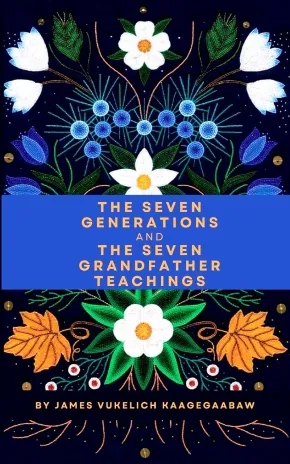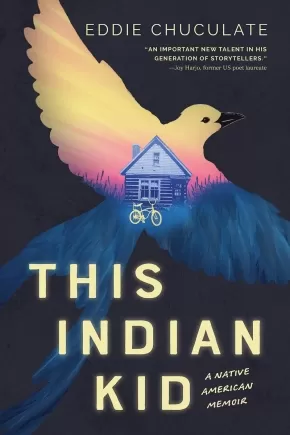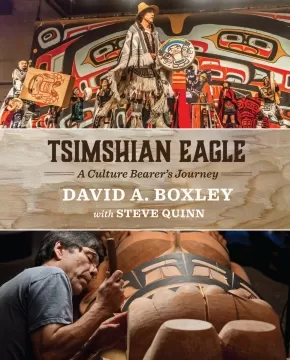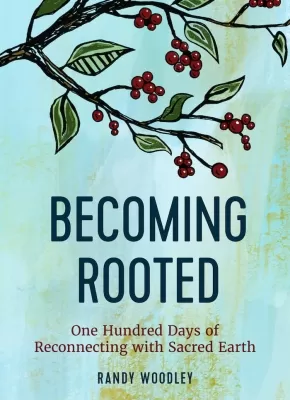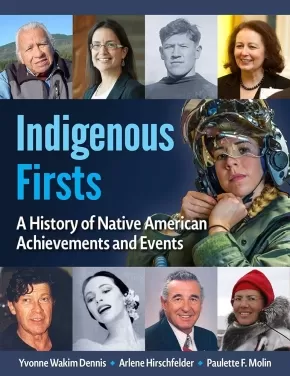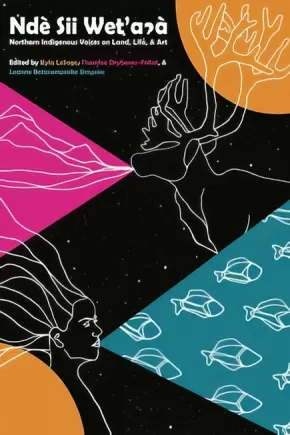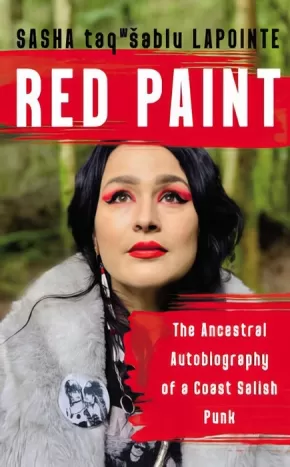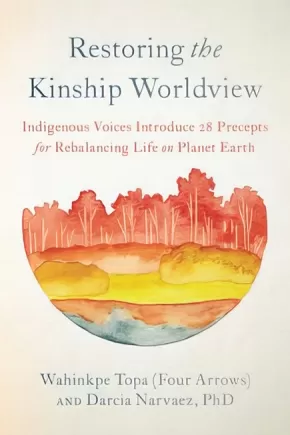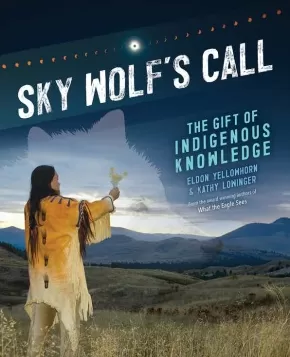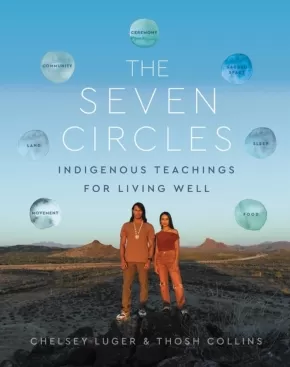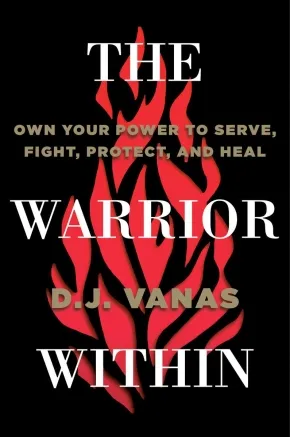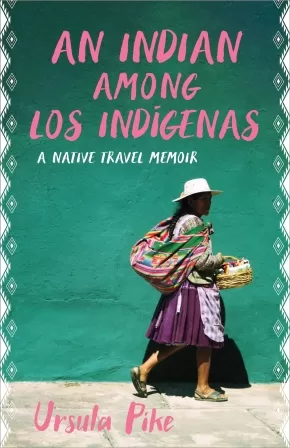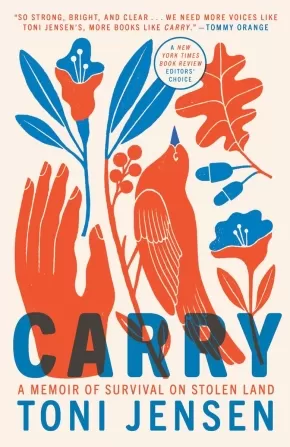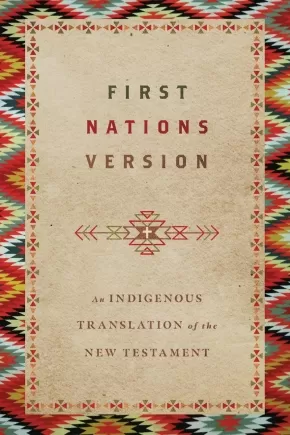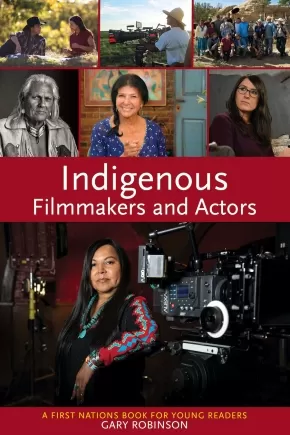
Indigenous Peoples in the United States
31
-
45
of
80 Results;
Sort By
Go To
of 6
The Seven Generations and The Seven Grandfather Teachings
$18.50
Format:
Paperback
Text Content Territories:
Indigenous American; Native American; Anishinaabeg; Ojibwe (Chippewa);
Reading Level: N/A
ISBN / Barcode: 9798988531302
Synopsis:
Synopsis:
Discover the profound wisdom of the Anishinaabe/Ojibwe people in The Seven Generations and The Seven Grandfather Teachings. In this captivating journey, you will immerse yourself in timeless teachings that illuminate the way to interconnectedness and interdependence. As the spiritual translation of the sacred laws, the Seven Grandfather teachings guide us towards Mino-bimaadiziwin, 'the good life' - a life of harmony, free from contradiction or conflict. Prepare to embark on a transformative path of peace and balance, where ancestral knowledge offers invaluable lessons for a fulfilling existence.
Additional Information
90 pages | 5.00" x 8.00" | Paperback
This Indian Kid: A Native American Memoir
$26.99
Format:
Hardcover
Text Content Territories:
Indigenous American; Native American; Muscogee (Creek);
ISBN / Barcode: 9781338802085
Synopsis:
Synopsis:
Award-winning author Eddie Chuculate recounts his experience growing up in rural Oklahoma, from boyhood to young manhood, in an evocative and vivid voice.
These books help readers learn about the world in which they live and develop their critical thinking skills so that they may become dynamic citizens who are able to analyze and understand our past, participate in essential discussions about our present, and work to grow and build our future.
"Granny was full-blooded Creek, but the Bureau of Indian Affairs insisted she was fifteen-sixteenths. She showed her card to me. I’d sit at the kitchen table and stare at her when she was eating, wondering how you can be a sixteenth of anything."
Growing up impoverished and shuttled between different households, it seemed life was bound to take a certain path for Eddie Chuculate. Despite the challenges he faced, his upbringing was rich with love and bountiful lessons from his Creek and Cherokee heritage, deep-rooted traditions he embraced even as he learned to live within the culture of white, small-town America that dominated his migratory childhood.
Award-winning author Eddie Chuculate brings his childhood to life with spare, unflinching prose. This book is at once a love letter to his Native American roots and an inspiring and essential message for young readers everywhere, who are coming of age in an era when conversations about acceptance and empathy, love and perspective are more necessary than ever before.
Educator Information
For ages 12+
This book is part of Scholastic Focus, the premier home of thoroughly researched, beautifully written, and thoughtfully designed works of narrative nonfiction aimed at middle-grade and young adult readers.
Additional Information
240 pages | 5.50" x 8.25" | Hardcover
Tsimshian Eagle: A Culture Bearer's Journey (1 in Stock)
$61.95
Format:
Hardcover
Text Content Territories:
Indigenous American; Alaska Native; Tsimshian;
Reading Level: N/A
ISBN / Barcode: 9781634050524
Synopsis:
Synopsis:
Raised by his grandparents in the tiny village of Metlakatla, Alaska, David A. Boxley left a secure teaching job in his hometown to pursue an uncharted path as a full-time Tsimshian artist, ultimately leading a revival of traditional culture, art, dance, and song. Tsimshian Eagle: A Culture Bearer's Journey chronicles Boxley's life and art through images and interviews. What emerges is a boundlessly creative, restless man who has dedicated his life to keeping Tsimshian culture alive.
Additional Information
240 pages | 8.25" x 10.25" | Hardcover
Becoming Rooted: One Hundred Days of Reconnecting with Sacred Earth
$29.99
Format:
Hardcover
Text Content Territories:
Indigenous American; Native American; Cherokee; United Keetoowah Band ;
Reading Level: N/A
ISBN / Barcode: 9781506471174
Synopsis:
Synopsis:
What does it mean to become rooted in the land? How can we become better relatives to our greatest teacher, the Earth? Becoming Rooted invites us to live out a deeply spiritual relationship with the whole community of creation and with Creator.
Through meditations and ideas for reflection and action, Randy Woodley, an activist, author, scholar, and Cherokee descendant, recognized by the Keetoowah Band, guides us on a one-hundred-day journey to reconnect with the Earth. Woodley invites us to come away from the American dream--otherwise known as an Indigenous nightmare--and get in touch with the water, land, plants, and creatures around us, with the people who lived on that land for thousands of years prior to Europeans' arrival, and with ourselves. In walking toward the harmony way, we honor balance, wholeness, and connection.
Creation is always teaching us. Our task is to look, and to listen, and to live well. She is teaching us now.
"This journey is your personal invitation into a different kind of relationship with nature—or, as I like to say, with the whole community of creation. It is also an invitation into a different kind of relationship with Creator, however you understand Creator to be present in your own life and within everything—as God, as Great Mystery, as a higher power, or as the universe." - Randy Woodley
Reviews
“Randy Woodley reminds us that we all have an understanding of what it means to be indigenous to a spiritual place. Through slowly unfolding layers of meaning, he shows us where we may discover that place for ourselves.”—Steven Charleston, elder of the Choctaw Nation of Oklahoma
“Becoming Rooted offers us a precious way back into the land: a way into restoration and reciprocity, a way into healing ourselves and the land, a way of belonging again, a way of finding out who we are. Randy Woodley takes us by the hand and walks with us for the first one hundred days. We begin to think and feel differently, our senses gain new direction, and we start to gain roots. I am so grateful for this book and for the life and work of Randy Woodley.”— Cláudio Carvalhaes, associate professor of worship, Union Theological Seminary
“Becoming Rooted draws you deeper into relationship with the land where you live. Few of us live in the place we were born, but these reflections take you past that disconnection and help you notice the world around you in new ways.”—Patty Krawec, Anishnaabe author and co-host of the Medicine for the Resistance podcast
Educator Information
Includes meditations, reflections, and action items for 100 days.
Additional Information
256 pages | 5.20" x 7.10" | Hardcover
Indigenous Firsts: A History of Native American Achievements and Events
$50.95
Format:
Paperback
Text Content Territories:
Indigenous American; Alaska Native; Native American;
ISBN / Barcode: 9781578597123
Synopsis:
Synopsis:
A celebration of achievement, accomplishments, and courage!
Native American Medal of Honor recipients, Heisman Trophy recipients, U.S. Olympians, a U.S. vice president, Congressional representatives, NASA astronauts, Pulitzer Prize recipients, U.S. poet laureates, Oscar winners, and more. The first Native magician, all-Native comedy show, architects, attorneys, bloggers, chefs, cartoonists, psychologists, religious leaders, filmmakers, educators, physicians, code talkers, and inventors. Luminaries like Jim Thorpe, King Kamehameha, Debra Haaland, and Will Rogers, along with less familiar notables such as Native Hawaiian language professor and radio host Larry Lindsey Kimura and Cree/Mohawk forensic pathologist Dr. Kona Williams. Their stories plus the stories of 2000 people, events and places are presented in Indigenous Firsts: A History of Native American Achievements and Events, including:
- Suzanne Van Cooten, Ph.D., Chickasaw Nation, the first Native female meteorologist in the country
- Caleb Cheeshahteaumuck, Wampanoag from Martha’s Vineyard, graduate of Harvard College in 1665
- Debra Haaland, the Pueblo of Laguna, U.S. Congresswoman and Secretary of the Interior
- Sam Campos, the Native Hawaiian who developed the Hawaiian superhero Pineapple Man
- Thomas L. Sloan, Omaha, was the first Native American to argue a case before the U.S. Supreme Court
- William R. Pogue, Choctaw, astronaut
- Johnston Murray, Chickasaw, the first person of Native American descent to be elected governor in the United States, holding the office in Oklahoma from 1951 to 1955
- The Cherokee Phoenix published its first edition February 21, 1828, making it the first tribal newspaper in North America and the first to be published in an Indigenous language
- The National Native American Honor Society was founded by acclaimed geneticist Dr. Frank C. Dukepoo , the first Hopi to earn a Ph.D.
- Louis Sockalexis, Penobscot, became the first Native American in the National Baseball League in 1897 as an outfielder with the Cleveland Spiders
- Jock Soto, Navajo/Puerto Rican, the youngest-ever man to be the principal dancer with the New York City Ballet
- The Seminole Tribe of Florida was the first Nation to own and operate an airplane manufacturing company
- Warrior's Circle of Honor, the National Native American Veterans Memorial in Washington, DC, on the grounds of the Smithsonian’s National Museum of the American Indian
- The Iolani Palace, constructed 1879–1882, the home of the Hawaiian royal family in Honolulu
- Loriene Roy, Anishinaabe, White Earth Nation, professor at the University of Texas at Austin’s School of Information, former president of the American Library Association
- Ben Nighthorse Campbell, Northern Cheyenne, U.S. representative and U.S. senator from Colorado
- Hanay Geiogamah, Kiowa /Delaware, founded the American Indian Theatre Ensemble
- Gerald Vizenor, White Earth Nation, writer, literary critic, and journalist for the Minneapolis Tribune
- Ely S. Parker (Hasanoanda, later Donehogawa), Tonawanda Seneca, lieutenant colonel in the Union Army, serving as General Ulysses S. Grant’s military secretary
- Fritz Scholder, Luiseno, painter inducted into the California Hall of Fame
- The Native American Women Warriors, the first all Native American female color guard
- Lori Arviso Alvord, the first Navajo woman to become a board-certified surgeon
- Kay “Kaibah” C. Bennett, Navajo, teacher, author, and the first woman to run for the presidency of the Navajo Nation
- Sandra Sunrising Osawa, Makah Indian Nation, the first Native American to have a series on commercial television
- The Choctaw people’s 1847 donation to aid the Irish people suffering from the great famine
- Otakuye Conroy-Ben, Oglala Lakota, first to earn an environmental engineering Ph.D. at the University of Arizona
- Diane J. Willis, Kiowa, former President of the Society of Pediatric Psychology and founding editor of the Journal of Pediatric Psychology
- Shelly Niro, Mohawk, winner of Canada’s top photography prize, the Scotiabank Photography Award
- Loren Leman, Alutiiq/Russian-Polish, was the first Alaska Native elected lieutenant governor
- Kim TallBear, Sisseton-Wahpeton Oyate, the first recipient of the Canada Research Chair in Indigenous Peoples, Technoscience, and Environment
- Carissa Moore, Native Hawaiian, won the Gold Medal in Surfing at the 2020 Tokyo Olympics
- Will Rogers, Cherokee, actor, performer, humorist was named the first honorary mayor of Beverly Hills
Foods of the Southwest Indian Nations by Lois Ellen Frank, Kiowa, was the first Native American cookbook to win the James Beard Award - Diane Humetewa, Hopi, nominated by President Barack Obama, became the first Native American woman to serve as a federal judge
- Susie Walking Bear Yellowtail, Crow, the first Native American nurse to be inducted into the American Nursing Association Hall of Fame
Indigenous Firsts honors the ongoing and rich history of personal victories and triumphs, and with more than 200 photos and illustrations, this information-rich book also includes a helpful bibliography and an extensive index, adding to its usefulness. This vital collection will appeal to anyone interested in America’s amazing history and its resilient and skilled Indigenous people.
Additional Information
496 pages | 7.19" x 9.18" | Paperback
Ndè Sii Wet'aà: Northern Indigenous Voices on Land, Life, & Art
$24.00
Format:
Paperback
Text Content Territories:
Indigenous Canadian; Inuit; Inuvialuit (Mackenzie Inuit); First Nations; Tutchone; Northern Tutchone; Dene; Tlicho (Dogrib); South Slavey (Deh Cho); North Slavey (Sahtu); Kaska Dena (Denek’eh); Denesuline (Chipewyan); Sayisi Dene; Cree (Nehiyawak); Métis; Indigenous American; Alaska Native; Dena?ina (Tanaina); Alutiiq (Sugpiaq);
Grade Levels: 12; University/College;
ISBN / Barcode: 9781927886625
Synopsis:
Synopsis:
Ndè Sii Wet'aà: Northern Indigenous Voices on Land, Life, & Art is a collection of essays, interviews, short stories and poetry written by emerging and established northern Indigenous writers and artists. Centred on land, cultural practice and northern life, this ground-breaking collection shares wealth of Dene (Gwichʼin, Sahtú, Dehcho, Tłı̨chǫ, Saysi, Kaska, Dënesuiné, W?ìl?ìdeh ) Inuit, Alutiiq, Inuvialuit, Métis, Nêhiyawak (Cree), Northern Tutchone, and Tanana Athabascan creative brilliance. Ndè Sii Wet'aà holds up the voices of women and Two Spirit and Queer writers to create a chorus of voices reflecting a deep love of Indigenous cultures, languages, homelands and the north. The book includes a series of pieces and interviews from established northern artists and musicians including Leela Gilday, Randy Baillargeon (lead singer for the W?ìl?ìdeh Drummers), Inuit sisters, song-writers and throat singers Tiffany Ayalik and Inuksuk Mackay of Piqsiq, Two Spirit Vuntut Gwitchin visual artist Jeneen Frei Njootli, Nunavik singer-songwriters Elisapie and Beatrice Deere and visual artist Camille Georgeson-Usher. Ndè Sii Wet'aà also includes writing from well-known northern writers Siku Allooloo, T'áncháy Redvers (Fireweed), Antione Mountain (From Bear Rock Mountain), Glen Coulthard (Red Skin, White Masks), Catherine Lafferty (Northern Wildflower, Land-Water-Sky) and Lianne Marie Leda Charlie, in amongst the best emerging writers in the north.
Additional Information
264 pages | 6.00" x 9.00" | Paperback
Red Paint: The Ancestral Autobiography of a Coast Salish Punk (HC) (1 in Stock)
$33.00
Format:
Hardcover
Text Content Territories:
Indigenous American; Native American; Salish; Coast Salish; Nooksack; Upper Skagit;
Grade Levels: 12; University/College;
ISBN / Barcode: 9781640094147
Synopsis:
Synopsis:
An Indigenous artist blends the aesthetics of punk rock with the traditional spiritual practices of the women in her lineage in this bold, contemporary journey to reclaim her heritage and unleash her power and voice while searching for a permanent home.
Sasha taqʷšəblu LaPointe has always longed for a sense of home. When she was a child, her family moved around frequently, often staying in barely habitable church attics and trailers, dangerous places for young Sasha.
With little more to guide her than a passion for the thriving punk scene of the Pacific Northwest and a desire to live up to the responsibility of being the namesake of her beloved great-grandmother—a linguist who helped preserve her Indigenous language of Lushootseed—Sasha throws herself headlong into the world, determined to build a better future for herself and her people.
Set against a backdrop of the breathtaking beauty of Coast Salish ancestral land and imbued with the universal spirit of punk, Red Paint is ultimately a story of the ways we learn to find our true selves while fighting for our right to claim a place of our own.
Examining what it means to be vulnerable in love and in art, Sasha offers up an unblinking reckoning with personal traumas amplified by the collective historical traumas of colonialism and genocide that continue to haunt native peoples. Red Paint is an intersectional autobiography of lineage, resilience, and, above all, the ability to heal.
Awards
- Winner of the 2023 Pacific Northwest Book Award
Reviews
"Red Paint is a miraculous book. Sasha LaPointe walks us through the sites of her evisceration while rebuilding a home within her body using sturdy materials: rose quartz, cedar bark, red clay, and the words of her ancestors. With each potent sentence, she shows us what access to power looks like. She shows us how to become whole.” —Elissa Washuta, author of White Magic
"As luminous as the morning sun over the fir forests, Red Paint is a story of where strength takes us. Sasha taqwšəblu LaPointe goes looking to the past to help heal from terrible traumas, finding inspiration in her ancestors, the Salish people. This is a book destined to be a classic. Read it." —Rene Denfeld, bestselling author of The Child Finder
Additional Information
240 pages | 5.31" x 8.29" | Hardcover
Restoring the Kinship Worldview: Indigenous Voices Introduce 28 Precepts for Rebalancing Life on Planet Earth
$28.95
Format:
Paperback
Text Content Territories:
Indigenous American; Native American; Indigenous;
Reading Level: N/A
ISBN / Barcode: 9781623176426
Synopsis:
Synopsis:
Selected speeches from Indigenous leaders around the world--necessary wisdom for our times, nourishment for our collective, and a path away from extinction toward a sustainable, interconnected future.
Indigenous worldviews, and the knowledge they confer, are critical for human survival and the wellbeing of future generations. Editors Wahinkpe Topa (Four Arrows) and Darcia Narvaez present 28 powerful excerpted passages from Indigenous leaders, including Mourning Dove, Robin Wall Kimmerer, Winona LaDuke, and Xiuhtezcatl Martinez. Accompanied by the editors’ own analyses, each chapter reflects the wisdom of Indigenous worldview precepts like:
• Egalitarian rule versus hierarchical governance
• A fearless trust in the universe, instead of a fear-based culture
• The life-sustaining role of ceremony
• Emphasizing generosity and the greater good instead of pursuing selfish goals and for personal gain
• The laws of nature as the highest rules for living
The editors emphasize our deep need to move away from the dominant Western paradigm--one that dictates we live without strong social purpose, fails to honor the earth as sacred, leads with the head while ignoring the heart, and places individual “rights” over collective responsibility. Restoring the Kinship Worldview is rooted in an Indigenous vision and strong social purpose that sees all life forms as sacred and sentient--that honors the wisdom of the heart, and grants equal standing to rights and responsibilities.
Inviting readers into a world-sense that expands beyond perceiving and conceiving to experiencing and being, Restoring the Kinship Worldview is a salve for our times, a nourishment for our collective, and a holistic orientation that will lead us away from extinction toward an integrated, sustainable future.
Reviews
“Humans have a particular ecological niche, a role as the custodial species of this earth. We must return our species to this niche within the next decade, or perish. This book is a perfect place to start—the foundation is good relations, making kin both human and nonhuman—and here we have story from a gathering of some of the finest Indigenous thinkers on the planet. Four Arrows and Darcia Narvaez have a particular way of bringing the right people together for such purposes.” —TYSON YUNKAPORTA, author of Sand Talk, senior research fellow at Deacon University, woodcarver, and poet
“Mahalo Four Arrows and Darcia Narvaez for this collection, this eloquence and grace through time so we can recognize and honor the common sense and purpose of continuity. All of it is needed now. We are all meant to wake up together.” —MANULANI ALULI MEYER, director of Indigenous education, University of Hawai‘i–West O‘ahu
“Darcia Narvaez and Four Arrows have gathered an inspiring pastiche of wise Native American voices woven together by their own insightful and heartfelt dialogues to gift us with an invaluable bundle of tenets and templates for the urgent project of decolonizing and rewilding our minds and communities.” —BILL PLOTKIN, PhD, author of Soulcraft, Wild Mind, and The Journey of Soul Initiation
Additional Information
336 pages | 6.00" x 8.95" | Paperback
Sky Wolf's Call: The Gift of Indigenous Knowledge
$16.95
Format:
Paperback
Text Content Territories:
Indigenous Canadian; Indigenous American;
ISBN / Barcode: 9781773216294
Synopsis:
Synopsis:
From healing to astronomy to our connection to the natural world, the lessons from Indigenous knowledge inform our learning and practices today.
How do knowledge systems get passed down over generations? Through the knowledge inherited from their Elders and ancestors, Indigenous Peoples throughout North America have observed, practiced, experimented, and interacted with plants, animals, the sky, and the waters over millennia. Knowledge keepers have shared their wisdom with younger people through oral history, stories, ceremonies, and records that took many forms.
In Sky Wolf’s Call, award-winning author team of Eldon Yellowhorn and Kathy Lowinger reveal how Indigenous knowledge comes from centuries of practices, experiences, and ideas gathered by people who have a long history with the natural world. Indigenous knowledge is explored through the use of fire and water, the acquisition of food, the study of astronomy, and healing practices.
Reviews
"An authoritative tribute to Indigenous knowledge systems that's a must-have for every library and classroom." - Kirkus Reviews
“Sky Wolf’s Call has an astoundingly broad scope introducing Indigenous Traditional Ecological Knowledge (TEK) in North America from time immemorial to the current day … This fast paced celebration of Indigenous innovation and technology is riveting.” - The British Columbia Review
Educator Information
Interest Age: 11+
Grade: 6+
Reading Age: 11+
A Junior Library Guild Gold Standard Selection
Table of Contents
Author’s Note
1: Sky Wolf’s Call: The Gift of Indigenous Knowledge: Foundational ideas behind Indigenous Knowledge and the importance of retaining, maintaining, and learning this sacred knowledge.
2: Water Knowledge Ways: Water links us all and is sacred. Indigenous people have fought to protect the gift of water from harm, and the critical role it has played in transportation, agriculture, irrigation, and food.
3: Fire and Smoke Knowledge: Fire and smoke are great gifts, including the burning of tobacco. In sacred ceremonies, smoke connects our breath with the heavens. Fire cooks our food, helps grow our crops, and even keeps our waters clean. Cultural burns are used to benefit the land.
4: Indigenous Knowledge and Food Security: Sharing, growing, and receiving food with family, community, and visitors is both an honour and a tradition. By understanding the traditional practices of salmon fishing, clam gardens, planting and harvesting certain crops, or hunting buffalo, Indigenous Peoples have respected what Mother Earth has to offer.
5: Healing Knowledge Ways: The use of the medicine wheel and the sweat lodge have been used over centuries and still help sick and troubled people. Games such as lacrosse and chunkey have helped in building individual strength and community spirit. And braiding together Indigenous healing and western science has opened new learning opportunities.
6: Sky Knowledge: From the earliest Indigenous astronomers to modern astrophysicists, these sky watchers have studied the sacred gifts of the sky: the sun, moon, planets, and stars that have produced maps, calendars, beliefs about how to govern, and even directions for building homes.
7: Keeping the Knowledge: Indigenous People hold oral narratives in high esteem because that was the way knowledge passed from one generation to the next. People in North America recorded important events with symbols, pictographs (paintings), and petroglyphs (carvings). Language Keepers and Knowledge keepers are making sure that Indigenous knowledge is never forgotten.
8: Sky Wolf’s Call: Indigenous knowledge is based on the idea that this world is a gift. Understanding the idea of connections (the skies with the earth, people with animals, the practical with the spiritual) is an important lesson with the challenges of climate change, pandemics, and wars. The wisdom of Indigenous Knowledge can help the whole world.
Thanks and Acknowledgments
Glossary
Selected Reading
Sources and Contacts
Additional Information
120 pages | 7.50" x 9.25" | Paperback
The Seven Circles: Indigenous Teachings for Living Well
$36.99
Format:
Hardcover
Text Content Territories:
Indigenous American; Native American; Sioux; Pima (Akimel O'odham); Osage; Haudenosaunee (Iroquois); Seneca; Cayuga; Anishinaabeg; Ojibwe (Chippewa); Turtle Mountain Anishinaabe;
Grade Levels: 12; University/College;
ISBN / Barcode: 9780063119208
Synopsis:
Synopsis:
In this revolutionary self-help guide, two beloved Native American wellness activists offer wisdom for achieving spiritual, physical, and emotional wellbeing rooted in Indigenous ancestral knowledge.
When wellness teachers and husband-wife duo Chelsey Luger and Thosh Collins founded their Indigenous wellness initiative, Well for Culture, they extended an invitation to all to honor their whole self through Native wellness philosophies and practices. In reclaiming this ancient wisdom for health and wellbeing—drawing from traditions spanning multiple tribes—they developed the Seven Circles, a holistic model for modern living rooted in timeless teachings from their ancestors. Luger and Collins have introduced this universally adaptable template for living well to Ivy league universities and corporations like Nike, Adidas, and Google, and now make it available to everyone in this wise guide.
The Seven Circles model comprises interconnected circles that keep all aspects of our lives in balance, functioning in harmony with one another. They are:
- Food
- Movement
- Sleep
- Ceremony
- Sacred Space
- Land
- Community
In The Seven Circles, Luger and Collins share intimate stories from their life journeys growing up in tribal communities, from the Indigenous tradition of staying active and spiritually centered through running and dance, to the universal Indigenous emphasis on a light-filled, minimalist home to create sacred space. Along the way, Luger and Collins invite readers to both adapt these teachings to their lives as well as do so without appropriating and erasing the original context, representing a critical new ethos for the wellness space. Each chapter closes with practical advice on how to engage with the teachings, as well as wisdom for keeping that particular circle in harmony with the others.
With warmth and generosity—and 75 atmospheric photographs by Collins throughout—The Seven Circles teaches us how to connect with nature, with our community, and with ourselves, and to integrate ancient Indigenous philosophies of health and wellbeing into our own lives to find healing and balance.
Reviews
“A life-changing holistic guide to wellness rooted in empowerment, resiliency, and ‘good medicine.’ This book is for any human being searching for wellness solutions in a chaotic world, a true antidote to colonization.” — Vina Brown, Indigenous Scholar, Entrepreneur, Artist, and Professor of Indigenous Studies at Northwest Indian College
“The Seven Circles is a true innovation in Indigenous thought; it brings our shared heritage and traditional teachings to life. Truly inspiring. Readers will find their journey to be a motivating guide for self-transformation.” — Taiaiake Alfred, Mohawk Philosopher
“While the term ‘wellness’ has been co-opted and diluted by (primarily white) social media influencers in recent years, Luger and Collins are recentering the conversation around how to use Indigenous cultural values, foods, and modalities of movement as tools for spiritual, mental, physical, and emotional healing.” — Vanity Fair
“[Two of the] faces in the health and wellness scene that are pushing for inclusivity, justice, and kindness, toppling old conventions to make their own…Luger and Collins rewrite modern narratives regarding Native health while addressing complex histories and ongoing disparities.” — Outside magazine
“Spellbinding. This may be the first book I’ve ever read that made me stop and decide, “I’m making this change now!” Seven Circles opened my eyes to a way of life that is tested by time, guided by nature, and urgently needed today." — Christopher McDougall, author of Born to Run, Natural Born Heroes, and Running with Sherman
“Wisdom abounds in this stimulating offering.” — Publishers Weekly
“Luger and Collins provide a range of sensible, informed, accessible guidance for both small- and large-scale lifestyle changes. An appealing manual for healing the self through Indigenous traditions.” — Kirkus Reviews
Additional Information
256 pages | 7.00" x 9.00" | 75 Colour Photos | Hardcover
The Warrior Within: Own Your Power to Serve, Fight, Protect, and Heal
$39.00
Format:
Hardcover
Text Content Territories:
Indigenous American; Native American;
Reading Level: N/A
ISBN / Barcode: 9780593423011
Synopsis:
Synopsis:
A transformational guide to getting yourself right in order to accomplish the work you were meant to do, from speaker, former U.S. Air Force officer, and member of the Ottawa tribe D.J. Vanas.
When faced with an important job, and people depending on you to do it, most of us will give and give until there’s nothing left. But running on empty, even for a worthy cause, only sets you up for failure in the long run. To persevere on the path to success requires more than sheer fearlessness and willpower. It requires what D.J. Vanas calls the warrior spirit, the kind of strength that looks outward but comes from deep within.
Drawing inspiration from Native American philosophy and tradition, The Warrior Within outlines a new model for personal power in the face of overwhelming chaos. A true warrior is not the toughest or bravest person in the room. A true warrior is committed to self-mastery, knows how to navigate change and disruption, transforms setbacks into opportunities for achievement, refuses to quit, and most importantly, always fights for something bigger than the self. With a vast array of stories and examples, from vision quests to treacherous hikes to veterans and service providers at the front lines, Vanas shows how to apply these principles to transform how you show up both for yourself and those around you.
More than an empowerment manual, The Warrior Within is a call to accomplish the world-changing work you were meant for by tapping into the power of the warrior spirit.
Reviews
"The powerful lessons imparted in these chapters will inspire strength, confidence and motivation, so that you can deliver your best in the worst of circumstances—while keeping your sanity and health! I encourage every healthcare giver to read The Warrior Within, for they truly serve, fight, protect and heal every day, often at their own expense."--LeAnn Thieman, author of the Chicken Soup for Nurse’s Soul series and founder of SelfCare for HealthCare®
"I highly recommend The Warrior Within! Through great storytelling, D.J. Vanas shares an often overlooked element of leadership ... taking care of yourself. Our beautiful Anishinaabe teachings emphasize balance in all things. Being a warrior means recognizing your needs and honoring your gifts. Way to go, D.J.!"--Angeline Boulley (Sault Ste. Marie Tribe of Chippewa Indians) New York Times bestselling author of Firekeeper's Daughter
"D.J. Vanas inspires us to find our ‘warrior spirit’ of courage, perseverance, resilience, and teamwork in life’s most fearful times. Your heart will soar like an eagle as you read how ordinary heroes use this inner strength to serve others—and how we can learn to do the same.”--Joseph Pfeifer, FDNY Assistant Chief, retired, author of Ordinary Heroes
“This is it: the book I’ve been waiting for! There isn’t another on the market that applies indigenous principles and ideas in order to expose the warrior in you. A comprehensive, compelling, emotional and amazingly insightful book. I couldn’t put it down. I wish I had this book years ago!"--Juanita Mullen (Seneca), AI/AN Veterans Liaison, Department of Veterans Affairs
“DJ Vanas describes a life of leading and doing through Indigenous identity and values. Combining his personal story with advice, The Warrior Within is more than a leadership book. It is a story of living a life of abundance and rich relationships, with DJ as your terrific guide.”-Cheryl Crazy Bull, President & CEO, American Indian College Fund
Additional Information
256 pages | 5.72" x 8.57" | Hardcover
An Indian among los Indígenas: A Native Travel Memoir (HC) (5 in Stock)
$39.95
Format:
Hardcover
Text Content Territories:
Indigenous American; Native American; Karuk; Indigenous South American; Indigenous Peoples in Bolivia;
Grade Levels: 12; University/College;
ISBN / Barcode: 9781597145275
Synopsis:
Synopsis:
A gripping, witty memoir about indigeneity, travel, and colonialism
When she was twenty-five, Ursula Pike boarded a plane to Bolivia and began her term of service in the Peace Corps. A member of the Karuk Tribe, Pike sought to make meaningful connections with Indigenous people halfway around the world. But she arrived in La Paz with trepidation as well as excitement, “knowing I followed in the footsteps of Western colonizers and missionaries who had also claimed they were there to help.” In the following two years, as a series of dramatic episodes brought that tension to boiling point, she began to ask: what does it mean to have experienced the effects of colonialism firsthand, and yet to risk becoming a colonizing force in turn?
An Indian among los Indígenas, Pike’s memoir of this experience, upends a canon of travel memoirs that has historically been dominated by white writers. It is a sharp, honest, and unnerving examination of the shadows that colonial history casts over even the most well-intentioned attempts at cross-cultural aid. It is also the debut of an exceptionally astute writer with a mastery of deadpan wit. It signals a shift in travel writing that is long overdue.
Reviews
“A brutally honest and badly needed story. . . Witty and clearly written, this memoir is a must-read, not just for Peace Corps volunteers, anthropologists, and others working in foreign lands, but for everyone—all of us finding ourselves in an ever increasing diverse and complex cultural landscape.”—Greg Sarris, author of How a Mountain was Made
“Ursula Pike's memoir is unlike any other I've read, with her perceptive, always-seeking, and lovely narrative voice. . . No one's written about the Peace Corps like this, with the details of food and family and landscape told through the vision of an Indigenous woman finding new stories in a deeply-rooted place miles from her own.”—Susan Straight
“In Ursula Pike’s perceptive and poignant debut memoir, a North American Indian woman knowingly enters the complex dynamics of voluntourism and discovers aspects about her own identity, colonialism, and comparative privilege while navigating the vivid landscapes and personalities of a small Bolivian community in the Andes.”—Chip Livingston, author of Crow-Blue, Crow-Black
“The Indigenous peoples Pike lived and worked with speak loudly from these pages, challenging many of us to check privileges we didn’t know we had, demanding the right to be complex, strong, and human. This book is all heart, all vulnerability, as a young California Indian woman makes family far from home.”—Deborah Miranda, author of Bad Indians: A Tribal Memoir
Additional Information
240 pages | 5.50" x 8.50"
Carry: A Memoir of Survival on Stolen Land
$24.00
Format:
Paperback
Text Content Territories:
Indigenous American; Métis;
Grade Levels: 12; University/College;
ISBN / Barcode: 9781984821201
Synopsis:
Synopsis:
Toni Jensen grew up around guns: As a girl, she learned to shoot birds in rural Iowa with her father, a card-carrying member of the NRA. As an adult, she’s had guns waved in her face near Standing Rock, and felt their silent threat on the concealed-carry campus where she teaches. And she has always known that in this she is not alone. As a Métis woman, she is no stranger to the violence enacted on the bodies of Indigenous women, on Indigenous land, and the ways it is hidden, ignored, forgotten.
In Carry, Jensen maps her personal experience onto the historical, exploring how history is lived in the body and redefining the language we use to speak about violence in America. In the title chapter, Jensen connects the trauma of school shootings with her own experiences of racism and sexual assault on college campuses. “The Worry Line” explores the gun and gang violence in her neighborhood the year her daughter was born. “At the Workshop” focuses on her graduate school years, during which a workshop classmate repeatedly killed off thinly veiled versions of her in his stories. In “Women in the Fracklands,” Jensen takes the reader inside Standing Rock during the Dakota Access Pipeline protests and bears witness to the peril faced by women in regions overcome by the fracking boom.
In prose at once forensic and deeply emotional, Toni Jensen shows herself to be a brave new voice and a fearless witness to her own difficult history—as well as to the violent cultural landscape in which she finds her coordinates. With each chapter, Carry reminds us that surviving in one’s country is not the same as surviving one’s country.
Reviews
“Like a murmuration of starlings, Toni Jensen’s new book Carry changes its shape constantly and effortlessly. . . . The value of Carry lies in its unique structure, its sparse, powerful prose, and in the stinging perspective it provides on events that are numbingly common. Until we see it as clearly as Jensen does, the lens she offers on gun violence in America will be relevant again and again and again.”—Chicago Review of Books
“In Carry, Jensen scours language to find a new way of writing about how historical injustices seep into the present. . . . With a controlled voice like a Philip Glass composition, smooth, meandering yet repetitive, Jensen considers her troubled past and begins the work of stitching herself back together. . . . An unsettling account that creeps into your bones.”—The New York Times Book Review
“Toni Jensen grew up around guns. But bird-hunting with her father was a much different experience than staring down bored barrels at Standing Rock. A new and much-needed voice, Métis author Jensen shares her deepest thoughts and most emotional experiences in Carry.”—Bustle
“Toni Jensen’s memoir is stunning. There’s no other words that come to mind—it’s about growing up Métis, existing as an Indigenous woman in America, and the looming threat of ever-pervasive gun violence. . . . A must-read.”—Alma (Alma’s Favorite Books for Fall 2020)
“Moving between personal recollections and historical observations, Jensen narrates what it means to be Métis, and what it feels like to be connected by bodies and land. . . . A meditative exploration of people and place that shows what it means to live and survive.”—Library Journal
“[A] debut memoir from a Native author enmeshed in the American way of violence, alienation, and death . . . a powerful rejection of a culture that has always been grounded in violence and intimidation.”—Kirkus Reviews
“Carry explores the gun’s tragic impact with heartfelt prose and deep intellect—on politics, on history, on Black and Indigenous bodies, on women’s bodies, and on children behind closed doors . . . It is full of difficult and vital news, delivered right on time.”—Terese Marie Mailhot, New York Times bestselling author of Heart Berries
Additional Information
304 pages | 5.24" x 7.94" | Paperback
First Nations Version: An Indigenous Translation of the New Testament
$28.99
Editors:
Format:
Paperback
Text Content Territories:
Indigenous Canadian; Indigenous American; Native American; Indigenous Central American; Indigenous Peoples in Mexico;
Reading Level: N/A
ISBN / Barcode: 9780830813506
Synopsis:
Synopsis:
A New Testament in English by Native North Americans for Native North Americans and All English-Speaking Peoples
Many First Nations tribes communicate with the cultural and linguistic thought patterns found in their original tongues. The First Nations Version (FNV) recounts the Creator's Story—the Christian Scriptures—following the tradition of Native storytellers' oral cultures. This way of speaking, with its simple yet profound beauty and rich cultural idioms, still resonates in the hearts of First Nations people.
The FNV is a dynamic equivalence translation of the New Testament that captures the simplicity, clarity, and beauty of Native storytellers in English, while remaining faithful to the original language of the Bible. The culmination of a rigorous five-year translation process, this new Bible translation is a collaboration between organizations like OneBook and Wycliffe Associates, Indigenous North Americans from over twenty-five different tribes, and a translation council that consisted of twelve Native North American elders, pastors, young adults, and men and women from different tribes and diverse geographic locations. Whether you are Native or not, you will experience the Scriptures in a fresh and new way.
Read these sample passages to get a taste of what you'll find inside:
"The Great Spirit loves this world of human beings so deeply he gave us his Son—the only Son who fully represents him. All who trust in him and his way will not come to a bad end, but will have the life of the world to come that never fades—full of beauty and harmony. Creator did not send his Son to decide against the people of this world, but to set them free from the worthless ways of the world." John 3:16-17
"Love is patient and kind. Love is never jealous. It does not brag or boast. It is not puffed up or big-headed. Love does not act in shameful ways, nor does it care only about itself. It is not hot-headed, nor does it keep track of wrongs done to it. Love is not happy with lies and injustice, but truth makes its heart glad. Love keeps walking even when carrying a heavy load. Love keeps trusting, never loses hope, and stands firm in hard times. The road of love has no end." 1 Corinthians 13:4-8
Reviews
"While Wildman recasts the New Testament in a distinctly Indigenous image, he remains faithful to evangelical interpretations of Christian scripture, typified in the many italicized explanations that appear throughout and are meant to add 'reasonably implied' clarifications and cultural notes, such as explication on ancient festivals like the Pentecost. This remarkable retelling offers plenty of rewards and will especially pique those open to a novel interpretation of the religious text." — Publishers Weekly starred review, August 2021
"Reading the First Nations Version of the New Testament is like listening to a wise elder pass down ancient teachings. Its oral cadences give the Scriptures new room to breathe. While contemporary translations focus on updating language in a modern mode, the FNV recaptures the sense of tradition that binds faithful readers to our past and to the story that tells us who we are. It is a good gift to everyone who walks the Jesus Way." — L. Daniel Hawk, professor of Old Testament and Hebrew at Ashland Theological Seminary
"From the beginning, the story of Jesus has been a translated story. Jesus spoke in Aramaic, but Matthew, Mark, Luke, and John wrote their Gospels in Greek. The story of Jesus is intended to be translated to every tribe, tongue, people, and nation. That translation is intended, not just permitted, serves to show how we must resist any cultural domination of the gospel. Terry Wildman has done a masterful job of rendering the New Testament into the storytelling motif characteristic of Native Americans. It should tell us something important when we realize how beautifully the story of Jesus can be adapted to the style and vocabulary of indigenous people. I deeply appreciate Terry Wildman's retelling of the story of Jesus for First Nations people. I believe the Great Spirit is pleased." — Brian Zahnd, pastor of Word of Life Church in St. Joseph, Missouri, and author of Beauty Will Save the World
"I've often wondered what it might look like if Jesus incarnated within another culture. Jesus, a first-century Jewish teacher in a corner of Rome's empire, lived, died, and rose as a human being within a specific time and place. What I love about the First Nations Version is how it translates this gospel story into a language of another context: First Nations! So get swept away into the story of the Great Spirit as he invites us to the blessing way of the good road. Read this beautiful retelling of the Scriptures that is not only beneficial for First Nations communities but for all who desire to allow the Great Spirit to transform their imaginations!" — Kurt Willems, pastor and auth
Educator Information
The First Nations Version (FNV) Translation Council consists of twelve First Nations individuals representing a cross-section of Native North Americans—elders, pastors, young adults, and men and women from differing tribes and diverse geographic locations. This council also represents a diversity of church and denominational traditions to minimize bias. The council determined the style and method of translation to be used and continues to be involved in ongoing translation, review, and cultural consultation. The FNV is a dynamic equivalence translation produced in partnership with Rain Ministries and OneBook Canada, with help from Wycliffe Associates.
AdditionalInformation
512 pages | 6.00" x 9.00" | Paperback
Indigenous Filmmakers and Actors
$10.95
Format:
Paperback
Text Content Territories:
Indigenous Canadian; Indigenous American;
ISBN / Barcode: 9781772601725
Synopsis:
Synopsis:
In these entertaining profiles, twelve Indigenous actors and filmmakers tell stories of the hard work and struggle that went into their careers. Overcoming prejudice and stereotypes in the film industry, fighting to make and promote films that demonstrate an honest portrayal of Indigenous life and heritage. Their stories show how there’s more to filmmaking than acting and directing, including writing, producing, editing, designing, and special effects.
Their accomplishments include acting in major blockbuster films and TV shows, directing prize-winning documentaries, running film programs, and starting a film festival to promote Indigenous voices. These twelve have stood on the shoulders of the Indigenous filmmakers who came before them, and are working to open doors for the next generation. They encourage young people to pursue their dream, and that their stories and ideas are valuable. Includes Tantoo Cardinal, Alanis Obomsawin, and Doreen Manuel.
Educator & Series Information
This book is part of the First Nations Series for Young Readers. Each book is a collection of biographies of First Nations, Métis, and Inuit women and men who are leaders in their fields of work, in their art, and in their communities.
Recommended for ages 9-14.
Subjects:
Language Arts
> Biography
Reflecting Diversity
> First Nations & Indigenous Peoples
Additional Information
128 pages | 6.00" x 9.00"
Sort By
Go To
of 6

